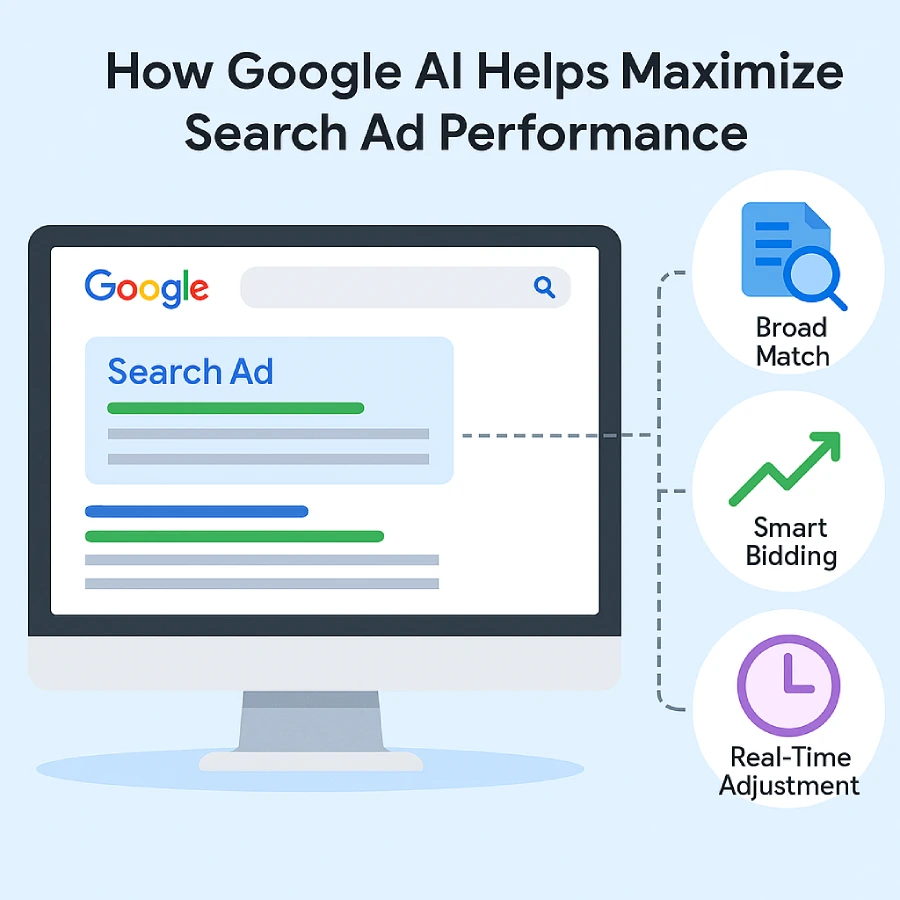With billions of searches on Google every day, how does Google AI help marketers maximize search ad performance?
- With Google AI, marketers no longer need to invest in high-quality image assets.
- With Google AI, broad match and Smart Bidding match ads to queries and adjust bids in real time.
- With Google AI, Smart Bidding predicts queries with the highest volume to set bids automatically.
- With Google AI, Ad Rank prioritizes expected clickthrough rate over ad relevance, or vice versa.
How Google AI Helps Maximize Search Ad Performance
With billions of searches on Google every day, marketers have a unique opportunity to reach potential customers — but how can they do that efficiently?
The answer: Google AI.
By combining broad match and Smart Bidding, Google AI empowers advertisers to reach the right users, at the right time, with the right bid — all in real time.

✅ Correct Answer:
With Google AI, broad match and Smart Bidding match ads to queries and adjust bids in real time.
Why This Is Correct:
Google AI uses machine learning to analyze:
- Search query intent
- Real-time context (location, device, time)
- Historical performance data
- Conversion likelihood
With this, Google AI:
- Uses broad match to match your ads to a wide range of relevant queries, not just exact keyword matches
- Uses Smart Bidding to automatically set your bid in each auction based on how likely a user is to convert
Real-Life Example:
Imagine you’re advertising “eco-friendly water bottles.”
You’re using the broad match keyword: reusable bottles.
User Search Query: “best BPA-free water bottles for hiking”
Even though this isn’t an exact keyword match, Google AI:
- Understands the intent behind the query
- Matches your ad using broad match
- Adjusts your bid in real time through Smart Bidding because the user is highly likely to convert
➡ Your ad appears to the right person, at the right price, at the right time.
❌ Why the Other Options Are Incorrect:
| Option | Why Incorrect |
|---|---|
| “Marketers no longer need to invest in high-quality image assets.” | ❌ Irrelevant to Search ads. High-quality assets still matter for visual campaigns like Performance Max or Display. |
| “Smart Bidding predicts queries with the highest volume to set bids.” | ❌ Google AI doesn’t optimize for volume alone — it optimizes for conversion likelihood. |
| “Ad Rank prioritizes CTR over ad relevance or vice versa.” | ❌ Ad Rank is based on multiple factors: CTR, ad relevance, landing page experience, etc. Google doesn’t prioritize one over the others. |
How Google AI Works Together:
| Component | Purpose |
|---|---|
| Broad Match | Expands keyword matching to capture more relevant queries |
| Smart Bidding | Adjusts bids in real time based on conversion potential |
| Google AI | Powers both systems using machine learning and contextual signals |
Additional Resources:
- Google Ads Help: Smart Bidding
- Broad Match and Smart Bidding Best Practices
- Google Ads Help: How Ad Rank Works
Summary:
| Statement | True or False | Explanation |
|---|---|---|
| Google AI uses broad match and Smart Bidding to adjust bids in real time | ✅ True | Real-time optimization based on context |
| Google AI removes need for good creatives | ❌ False | Creative quality still matters |
| Google AI targets high-volume queries only | ❌ False | Focus is on intent and conversion, not volume |
| Ad Rank favors CTR over ad relevance | ❌ False | Both are weighted equally with other factors |
Benefits of Google AI in Search Ads
- Wider reach with relevant queries through broad match
- Smarter bidding decisions at the exact time of the auction
- Higher performance with less manual management
- Better ROI from real-time machine learning and automation
FAQs
Q: Do I need to use both Broad Match and Smart Bidding together?
A: It’s highly recommended. Broad Match works best when paired with Smart Bidding for relevance and efficiency.
Q: Does Google AI always get it right?
A: While not perfect, Google AI continuously learns and improves based on conversion signals and campaign performance.
Q: Will using Google AI reduce my workload?
A: Yes — it significantly cuts down on manual keyword management and bid adjustments, letting you focus on strategy and creative.
Conclusion:
In today’s AI-powered advertising landscape, Google Ads helps marketers maximize Search ad performance by:
- Using Broad Match to understand intent beyond keywords
- Leveraging Smart Bidding to adjust bids in real time based on performance signals
- Enabling automated optimization so you reach the right person at the right time, at the right price
This means less manual work and better results, especially in competitive search environments.

